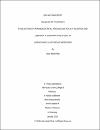National assessment of pharmaceutical workforce and education using the International Pharmaceutical Federation's global development goals: a case study of Qatar
Date
2021Author
Mukhalalati, B. A.Ibrahim, Mohamed Izham Mohamed
Al Alawneh, M. O.
Awaisu, Ahmed
Bates, I.
Bader, L.
...show more authors ...show less authors
Metadata
Show full item recordAbstract
Background
The sustainable development goals were launched by the United Nations in 2015. Its fifth goal was describing the achievement of universal health coverage by 2030. This goal reaffirms the importance of investing in the development and training of the global health workforce. In alliance with this, the International Pharmaceutical Federation (FIP) has published reports about pharmacy workforce planning in several countries. However, data about Qatar were not included in these reports. In 2017, FIP developed a transformational roadmap of pharmaceutical workforce and education. One systematic framework component of the roadmap is the Pharmaceutical Workforce Development Goals (DG[w]s) that were released in late 2016 and subsequently incorporated into the more comprehensive Global Development Goals1 in 2020, encompassing not only workforce development, but additionally practice and pharmaceutical science development. This study aimed to evaluate the current situation of pharmacy workforce and education in Qatar in relation to the original 13 Pharmaceutical Workforce Development Goals (DG[w]s). The objective was to identify the gaps in pharmacy workforce and education and to recommend evidence-led strategies to be included in both the Ministry of Public Health and the Qatar University College of Pharmacy workforce development plans.
Methods
Three rounds of conventional Delphi technique were conducted with expert panels of key decision-makers in pharmacy practice from the College of Pharmacy at Qatar University and the Ministry of Public Health, utilizing the FIP’s self-assessment survey. Qualitative content analysis was used to analyze and prioritize the identified gaps from the collected data. DG[w] was considered “met” if all the provided indicators were achieved, “partially met” if at least one of the indicators were achieved, and “not met” if none of the indicators were achieved
Results
The lack of competency framework (DG[w]5), workforce data (DG[w]12), and workforce policy formation (DG[w]13) are three major gaps in the provision of pharmaceutical workforce and pharmacy education in Qatar, influencing other DG[w]s. These gaps need to be addressed by the formation of Qatar Pharmaceutical Association through which academic, practice, and policymaking sectors can work together in developing health workforce intelligence system.
Conclusion
The results indicated that DG[w]s are interrelated and a gap in one goal can negatively influence others. Results and recommendations of this research will facilitate the implementation of strategic plans across leading pharmacy sectors to meet health needs in Qatar and achieve the third pillar of the Qatar National Vision 2030.
Collections
- Pharmacy Research [1315 items ]
Related items
Showing items related by title, author, creator and subject.
-
EVALUATION OF PHARMACEUTICAL PRICING AND POLICY IN QATAR AND LEBANON: A COMPARATIVE STUDY OF CARDIOVASCULAR DISEASE MEDICINES
Abdel Rida, Nada (2018 , Master Thesis)The study aimed to review the pharmaceutical pricing policies and to assess prices, availability, and affordability of essential cardiovascular disease medicines in Qatar and Lebanon across multiple sectors. A thorough ... -
Data extraction error in pharmaceutical versus non-pharmaceutical interventions for evidence synthesis: Study protocol for a crossover trial
Yi, Zhu; Ren, Pengwei; Doi, Suhail A.R.; Furuya-Kanamori, Luis; Lin, Lifeng; Zhou, Xiaoqin; Tao, Fangbiao; Xu, Chang... more authors ... less authors ( Elsevier , 2023 , Article)BackgroundData extraction is the foundation for research synthesis evidence, while data extraction errors frequently occur in the literature. An interesting phenomenon was observed that data extraction error tend to be ... -
An insight into the pharmaceutical sector in Yemen during conflict: challenges and recommendations
Alshakka, M.; Ibrahim, Mohamed Izham Mohamed; Bahattab, A.; Badulla, W. F. S.; Shankar, P. R. ( Routledge , 2020 , Article)In our world today, we need to understand, measure, and respond to inequality. The conflict and siege in Yemen have caused serious repercussions and consequences for the pharmaceutical sector and health of the people. ...


